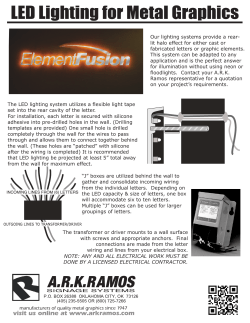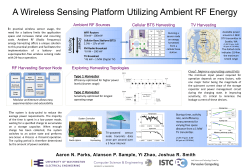
888888 UNITECH makes the indication and control of Process Parameters
Technical Manual UNITECH INSTRUMENTS UT-1596/UT-1572/UT-1584/UT-1548 PID CONTROLLERS PV PV SV 8 88 8 888 8 OUT SV 8 88 8 8 88 8 AT OUT AL1 AT AL1 8 88 8 AL2 AL2 0% A/M 20 40 60 80 100% OUT OFF 8 88 8 PV AT AL1 8 88 8 SV AL2 OUT Model :UT 1144 Model :UT 1149 OFF 8 88 8 AT AL1 PV SV AL2 Model :UT 11 77 Model :UT 11 96 UNITECH makes the indication and control of Process Parameters “Sure for service with hi-end Universal Technology” Add.-503/504,Helix Complex , Opp. Surya Hotel, Sayajigunj, Vadodra-05. Gujrat. INDIA, PH-0265 6623551 Sales: +91 94273 01436 Website: www.unitechinstrument.com Email : info@unitechinstrument.com DIGITAL PID CONTROLLERS UNITECH UT - 1596/1572/1584/1548 INSTRUCTION MANUAL Specification Overview The UT 15 Series are microprocessorPV based controllers designed with a high degree of functionality and reliability at a PV SV 888 888 8 88 8 OUT SV 888 888 8 88 8 AT OUT AL1 AT AL1 8 88 8 AL2 AL2 0% A/M 20 40 60 80 100% OUT OFF 888 8 AT AL1 PV 8 88 8 SV AL2 competitive price. The controllers are OUT Model :UT 1144 Model :UT 1584 available in different formats: 48x48, OFF 8 88 8 AT AL1 PV SV AL2 Model :UT 117 7 72x72, 96x96 This controller series is Model :UT 15 96 Ideal for the control of temperature, Humidity, pressure, flow etc. z Dual Display and Bar graph z IP65 Front Face Protection in a variety of applications including: Two large 4 digits display PV, SP and IP65 rated front face permits use in z Plastic Processing Industries configuration parameters. One 10 LED applications where it may be subjected to z Packaging Machinery bar-graph displays the control output moisture, dust conditions. z Painting and coating Plants (MV), and up to 8 LEDs display the status z z Semiconductor packaging / Testing of the different outputs (Control, Alarm, The setpoint can be defined from a z Industrial Dryers …) and also provide indication of the remote PLC or other controller. z And many more...... Auto/Manual and programmer states. z Features z Easy to Operate Setpoint Programming Two programs are available with a maximum of 8 segments. The 2 programs Different configuration levels provide easy can be linked together and perform as a access to parameters. single 16 segment program. z Various Control Programming z Extended Alarm Capability Several different algorithms are available Up to three different alarm outputs are as follows: available per instrument and 17 kinds of - PID or ON/OFF Control event modes can be assigned to each of - Heat/Cool Control with 2 PID sets alarm output. - Motor Position Control (without slidewire feedback) z Auto-Tuning Capability z Communications RS232 or RS485 (with ASC II & Modbus RTU Protocol) is optionally available with Advanced auto-tuning function calculates a maximum communication speed of the optimized PID values for your specific 38400 bps. control system. z Remote Setpoint Capability Parameter Lock A 4-digit security code prevents any unauthorized changes of parameters or configurations. Parameters can be hidden to user to prevent any mis-configuration of the unit. Specifications General Rated power supply voltage 85 to 265V AC, Frequency : 50/60Hz 22 to 26V AC, Frequency : 50/60Hz (Rating : 24VAC) 22 to 26V DC (Rating : 24VDC) Power Consumption Insulation Resistance 5VA Max (at 24V AC) 160mA max (at 24VDC) 7VA Max (at 100V AC) 10 VA max (at 240V AC) OVER 10MΩ UNDER DC500V megger between Input terminal and Case(Ground). OVER 10MΩ UNDER DC500V megger between Output terminal and Case(Ground). Standard Ambient Temp.. 25 + 2 °C Conditions Ambient Humi. 55 ± 5% RH Rated Power Supply 230V AC, 24V AC, 24VDC Power Frequency 50 ± 1Hz o± 60 ± 1HZ Operating Ambient Temp. 0 to 50°C Conditions Ambient Humi. 20 to 90%RH (non-condensing) Rated Power Supply 85 to 265V AC 22 to 26V DC Allowable Power 85 to 265V AC Supply 22 to 26VDC Power Frequency 50 ± 2Hz o± 60 ± 2Hz Transportation Ambient Temp. -20 to +65 °C and storage Ambient Humi. 10 to +95% RH (non-condensing) conditions Vibration Resistance 20m/s2 (Approx. 2G), 10 to 55Hz for 2 hours each in X, Y, Z directions Exterior Case and front panel : plastic Mounting Panel-mount Model Exterior Size (unit: mm ) inch UT-1548 UT-1584 UT-1572 UT-1596 50 X 50 X 97 50 X 96 X 97 74 X 74 X 97 96 X 96 X 97 (1.97X1.97X 3.82) (1.97X3.78X3.82) (2.91X2.91X3.82) (3.78X3.78X3.82) 44.5 X 44.5 44.5 X 90.5 68.5 X 68.5 90.5 X 90.5 (1.75 X 1.75) (1.75 X 3.56) (2.97 X 2.97) (3.56 X 3.56) :WXHXD Panel Cutout (unit: :WXH mm ) inch 1. Specifications Input/Output Analog Number of Point Input 1 Type 1 point (TC, RTD or Linear) TC: K, J, R, S, B, E, T RTD : Pt-100 Linear : 4~20mA / 2~10V DC (500 Ω Resistance connected Across) 0~20mA / 0~10V DC (500 Ω Resistance connected Across) Refer to Table A. Note : For input Type symbols and Ranges. Sampling cycle 250 ms Indication ± 0.2% FS ± 1digit (for details Table1-1) Accuracy Cold junction ±1.0ºC (under standard conditions) accuracy Output Input bias (offset) LSPL ~ USPL Digital Filter 0 - 200 sec (0: filter off) Decimal Point 0000, 000.0, 00.00, 0.000 Alarm Output Relay Contact Output : 250V AC, 3A (Resistive Load) Control Output Relay Contact Output : 250V AC, 3A (Resistive Load) Voltage Pulse 0/12V DC. (Load Resistance 600 Ω or More) Current Output 4 to 20mA DC. (Load Resistance 500 Ω or Less) Trigger Output (For TRIAC Driving) 100A or LessCurrent Output 2. Mounting Mounting Cautions : (1) Use this instrument within the following ambient temperature and ambient humidity. z Allowable ambient temperature: 0 to 50°C z Allowable ambient humidity: 45 to 85% RH (2) Avoid the following when selecting the mounting location. z Rapid changes in ambient temperature which may cause condensations. z Corrosive or inflammable gases. z Direct vibration or shock to the mainframe. z Water, oil, chemicals, vapour or steam splashes. z Excessive induction noise, static electricity, magnetic fields or noise. z Direct air flow from an air conditioner. z Exposure to direct sunlight. z Excessive heat accumulation. External Dimensions Mounting Procedure Mounting Cautions : (1) Use this instrument within the following ambient temperature and ambient humidity. z Allowable ambient temperature: 0 to 50°C z Allowable ambient humidity: 45 to 85% RH (2) Avoid the following when selecting the mounting location. z Rapid changes in ambient temperature which may cause condensations. z Corrosive or inflammable gases. z Direct vibration or shock to the mainframe. z Water, oil, chemicals, vapour or steam splashes. z Excessive induction noise, static electricity, magnetic fields or noise. z Direct air flow from an air conditioner. z Exposure to direct sunlight. z Excessive heat accumulation. Mounting Procedures (1) Prepare the panel cutout as specified in 2.2 Dimensions. (2) Insert the instrument through the panel cutout. (3) Insert the mounting bracket into the mounting groove of the instrument. (As Fig.1) (4) Pull till chick sounds to the direction shown by the arrow. (As Fig.2) (5) The other mounting bracket should be installed the same way described in 3.To 4. 3. WIRING Wiring Cautions : (1) For thermocouple input, use the specified compensation wire. (2) For RTD input, use leads with low resistance and having no resistance differences among the 3 leads. (3) Conduct input signal wiring away from instrument power, electric equipment power and load lines to avoid noise induction. (4) Conduct instrument power wiring so as not to be influenced by noise from the electric equipment power. If the instrument may be affected by external noise, a noise filter should be used. * shorten the distance between twisted power supply wire pitches. The shorter the distance between the pitches, the more effective for noise reduction. * Install the noise filter on the panel which is always grounded and minimize the wiring distance between the noise filter output side and the instrument power terminals. * Do not install fuses and/or switches on the filter output signal since this may lessen filter effect. (5) For wiring, use wires conforming to the domestic standard of each country. (6) About 4 to 5 seconds is required as the preparation time for contact output after power on. Use the delay relay when the output line is used for an external interlock circuit. (7) This instrument has no power supply switch nor fuses. Therefore, install the fuse close to the instrument and the switch, if required. * Recommended fuse rating: Rated voltage; 250 V Rated current; 1A * Fuse type; Time-lag fuse (8) Do not excessively tighten the terminal screws. In addition, use the solder less terminal appropriate to the screw size. (9) To the instrument with power supply of 24V, please be sure to supply the power from SELV circuit Terminal Configuration : (1) All the under hookups are only for reference. (2) For wiring, please according to the hookup label which was glued on the plastic case of controller. UT-1584 & UT-1596 1 L AL 2 AC 85~265V 2 3 UT-1572 N C NO OUT: Relay DC4-20mA - - + + NC 11 12 13 NO 1 UT-1145 L 2 1 2 AL 1 11 OUT: Relay DC4-20mA - 7 RTD A NC 8 + 9 4 5 NO 6 NC TC NO 5 + + - 4 9 5 AL 1 14 15 10 6 11 7 12 8 16 NO VDC B - AL 1 3 B - 10 7 C - V, mA, Current 3 NO 8 NO OUT: Relay 12 4-20mA OR 0-20mA N Voltage for SSR + NO NO 4 6 AC 85~265V N L AL 2 C AL 2 AC 85~265V + 4-20mA OR 0-20mA VDC RTD A B + 13 - 9 TC + + - B - 14 VDC + RTD A + B 17 18 4-20mA OR 0-20mA 19 TC 10 - B - 20 4. FRONT DESCRIPTION 5. SETTING 6. PID Autotuning (AT) Function 7. Error Display 08. Selection Table UT - 15 XX Size Type 96 X 96 X X X CNT. Output Code Type 96 None Code Code 1 2 N – R 1 2 X Other Output Type Code None N 84 Relay 72X72 72 SSR S 1 2 TPS 24VDC 2 48X48 48 4-20mA C 1 RS-485 3 96X48 (V) 4-20mA Re-Tra. 1
© Copyright 2025













